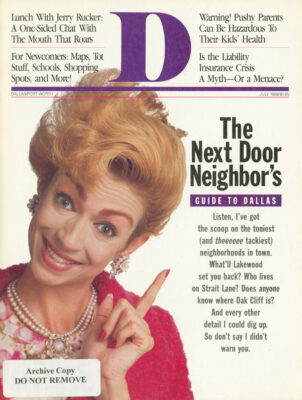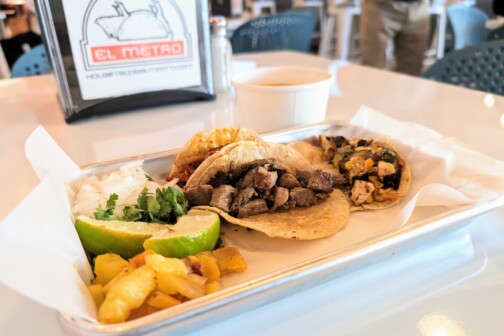T. Boone Pickens Jr. he ain’t. But what Michael Neary may indeed be is one of the new breed of corporate raiders. Not as well versed with the media as a Pickens, perceptibly uncomfort-able with the raider rhetoric, yet composed. The takeover of a corporation with a $55 million price tag is just one more important deal on the very crowded table of this Dallas developer.
Neary is the l’N” of Dallas-based CNS Partners, which for the past six months has been persistently pursuing the takeover of Hawaii’s second-largest interisland carrier. Aloha Airlines. But “the friendliest name in flight” has given CNS anything but a friendly reception; it’s the classic case of a hostile takeover.
Unless you are in the real estate business, the name Michael Neary probably won’t mean anything to you. He’s president and founder of The Dimension Companies, a Dallas-based real estate company that is involved in everything from the development of raw land to the building of apartments, shopping centers, and hotels.
Neary started as a land broker, specializing in acquiring sites for regional malls. Now, he has one of those offices on one of the top floors of one of those buildings in downtown Dallas. You know, the kind with the view from here to Oklahoma, furnished with modern leather chairs, lots of black lacquer and marble, and original works of art.
So, if Neary is surrounded by all of these symbols of success, why doesn’t the name of Michael Neary carry the bedazzling effect of names like Trammell Crow or John Eulich?
For one reason, Neary hasn’t been as successful as Crow or Eulich. For another, Neary intentionally kept a low profile before the Aloha deal, directing media attention to his projects and to others in his company. Neary has gained a reputation in the real estate community for finding the best new talent to bring into his company. When Neary finds someone he wants, he doesn’t hesitate to get into a battle of the bucks. And he usually wins. Impressed by a lawyer’s secretary in a real estate closing, Neary offered her a job more than matching her salary. The secretary thanked him for the offer-and for the raise her boss gave her to match Neary’s offer- but insisted that she liked her present job. Neary offered more. The lawyer saw him and raised him a few thousand. Neary finally called, asking how high the lawyer was willing to go and letting him know that he would go higher. Finally, everybody but the lawyer was happy.
And after all, the Crows and Eulichs of this city have a few years on Neary. He turned thirty-five in April.
So, what’s a young guy like this doing reaching for a $55 million deal in the sky while most of the other developers in Dallas are wallowing in some pretty pricey dirt?
Neary isn’t without problems, but lucky for him, he says. Dimension had the foresight to spread out from the Texas market two years ago and move into areas such as Atlanta and Washington, D.C., which haven’t been as plagued by overbuilding and the residual effects of the oil and gas slump. (Neary says, “Being a developer in Texas, you are also in the oil business. You just may not know it.”)
So, in a better position than some other developers, Neary has been practicing what many in the real estate business are preaching-diversification-the solution, the road to what Neary calls “serious wealth.”
Two years ago, when Neary started thinking about getting “serious wealth” by buying and selling not just land or office buildings but corporations, he went to Harvard Business School to interview the best of the soon-to-be-graduates. That’s where he met Norman Siegal-eventually the “S” of CNS Partners.
“We tried to hire Norm, but unfortunately, he was lured by the beaches of Southern California and took another job.” Neary recalls. “But his other job didn’t work out to his satisfaction, and in November of 1985, Norm called and told me he had an investment opportunity.”
That “investment opportunity” was Aloha, Inc., the holding company for Aloha Airlines. And it was singled out from more than 2,000 investment opportunities that Siegal had been taking a look at himself- some for just a few minutes, others for several months. But lacking the financial means to pursue the deal alone, Siegal, a Fort Worth resident, called Neary.
To Neary, Aloha seemed like a good deal: the airline has recently overtaken Hawaiian Air (HAL) as the market leader in the Islands. Aloha had a difficult 1984, but bounced back in the first quarter of 1985 to post operating earnings of $2.6 million. For the same period this year. Aloha reported a record $4.9 million in earnings. Declining fuel prices also made Aloha attractive. Each 1-cent drop in fuel prices means $20,000 to Aloha’s bottom line, according to Neary. The Hawaiian airlines, moreover, have something of a captive market. Neary and partners don’t feel that the customers there are so price sensitive that the fuel savings will necessarily have to be passed on to them. And, Siegal adds, fuel savings are being passed on to customers back on the Mainland, making it cheaper and cheaper to fly to Hawaii. More tourists mean more business for island-hopping Aloha.
And timing has been right for CNS. Terrorism in Europe has only fueled the increase in Hawaiian tourism. The growing strength of the Japanese yen hasn’t hurt either. The future for Aloha looks good.
It was January before Neary could get Siegal and the “C” of CNS, James Cruce (president of Peoples Heritage Federal Savings & Loan of Salina, Kansas), and himself together in New York with lawyer Dennis J. Block, a savvy insider with the Manhattan firm of Weil, Gotshal, & Manges.
While they were drawing up their partnership agreement, CNS learned that there was someone else interested in Aloha Airlines. On January 17, that “someone” started to buy. Aloha’s stock rose 2 1/2 points to a record 13 5/8 on about 13,900 shares. At that time. Aloha announced that two of the airline’s key shareholders and directors-Chairman Hung Wo Ching and Vice-Chairman Sheridan C.F. Ing-and some of their family members as well as other company directors had entered into a consolidated voting agreement and now represented 37 percent of the company’s common stock. Further. Aloha’s president. A. Maurice Myers, announced that the company had retained the services of a Wall Street investment banking firm. Bear, Stearns & Co., for advice on ways to “enhance shareholder value.” (Actually, they had retained Bear Stearns much earlier, in November.) To Neary and his partners, that sent out a clear message to potential buyers: you don’t hire an investment banker if you aren’t looking to sell, and Ching and Ing were putting together a large block to make it known that they could, in fact, deliver the stock.
There is still some mystery about who started the buying, but Neary and partners didn’t hesitate after the events of January 17; they jumped in and started to buy Aloha.
Down in the Islands those speculating about Ching and Ing’s “message” gave it another interpretation. Reporters following the story were picking up a different attitude on the part of Aloha’s biggest owners: if there was going to be any shift of control, they sensed, it would be on the company’s own terms. Reporting on recent rumors, papers used terms like “a Mainland group” and a “non-travel company in Texas” to describe who might be making a run on the company. Those reports were picking up on an emotional conflict-Mainlanders versus Islanders-that Neary and partners wouldn’t feel first hand for a few more months.
Acquisition of Hawaiian corporations by Mainlanders is nothing new. One of the better known Mainland-Island takeovers was the Irwin Jacobs play for Castle & Cooke. the parent company of Dole Foods, which was eventually acquired by another Mainlander, David Murdock. To defend against such takeovers, the Hawaii State Legislature has passed laws to make it more difficult on raiders. There has been some question whether Aloha can seek refuge under the anti-takeover statutes since it rein-corporated in Delaware as part of a so-called “poison pill” anti-takeover effort several years ago. At last May’s annual meeting of shareholders, several poison pills were approved that, directors hoped, would make Aloha more difficult to swallow.
By early February, CNS Partners had acquired almost 13 percent of the interisland carrier {an estimated $4.4 million to $5.1 million investment) and in a required disclosure filing with the federal Securities and Exchange Commission, indicated that it might “consider seeking control of the company,” in the polite terms of the takeover game. Aloha stock had risen to $20.
Meanwhile, Ching and Ing were gearing up for a battle. They were preparing to buy more stock in the company and would eventually bring their ownership of preferred stock up to a 51.4 percent controlling interest. They were also beginning a verbal battle in the Honolulu papers by announcing that they would “spend what it takes” to increase their common stock holdings to more than 50 percent. Now the message was crystal clear: Mainlanders. go home.
By that time, CNS Partners had already contacted Aloha president Myers and met with him in Los Angeles. CNS expressed its interest in purchasing the airline but was told that Aloha was not for sale. Puzzled, Neary wondered anew why Aloha had called in Bear Stearns. Were Ching and Ing planning to take the company private through a leveraged buyout?
Myers denied everything, but that didn’t stop CNS. On March 11. CNS Ruiners, controlling 15.9 percent of the company, made a proposed cash merger offer for all outstanding shares of Aloha stock at a price of $27.50 per share. With the stock still trading around $20 a share, CNS felt its offer was a good one. News of the proposed offer pushed the price of the stock to a new high-25 1/2-on March 14.
Myers expressed surprise at the offer, and no wonder. He had just told CNS at their Los Angeles meeting that the company was not for sale. His anxieties were typical of management in the thick of a hostile takeover battle: the investor group didn’t have airline experience: it might be buying the company just to liquidate its valuable assets, pocket the profit, and then go back to spend the spoils on the Mainland. And Myers may have feared a house-cleaning would follow a takeover, leaving management without a job (although key executives would have a “golden parachute,” a chunk of severance pay to soften the blows of such hostile takeovers). Myers was also alarmed by CNS’s so-called bootstrap effort, in which financing of the takeover would be arranged using the assets of the company as collateral, therefore saddling it with a large debt. That, Myers maintained, would be bad for Aloha.
Also on March 14. in another filing with the SEC, CNS indicated that it then owned 18.5 percent of the airline and had brought on another partner. Dallasite Charles Wilson, president of The Cambridge Companies Incorporated, a real estate and investment firm, had approached CNS with his 2.81 percent of Aloha. He wanted to join the effort.
Five days later, the Aloha board of directors, Ching and Ing presiding, voted unanimously to reject the CNS offer. Siegal responded to the eager press: “We are surprised and disappointed [read: mad as hell] that our cash merger offer of $27.50 was rejected by the board in light of the tact that the stock was selling for approximately $20 prior to our offer.” [Read: to save their skins, they are shirking their fiduciary responsibility to the shareholders.]
In the Honolulu papers, the battle was boiling. Ching and Ing were firing off lines like “we won’t sell at any price.” Siegal was denying charges that CNS might sell off the company’s assets if the takeover was successful.
And in April another party entered the battle. Burton Knapp, a New York attorney and minor Aloha stockholder, filed a class-action suit against the company’s management and directors charging that they had failed in their fiduciary responsibility to shareholders in rejecting the bid by CNS. Next, John Bellinger, an Aloha director and chairman and CEO of First Hawaiian Bank (Aloha’s largest lender), resigned, citing a conflict of interest because of his lending position. But observers speculated that Bellinger had quit to avoid the coming battle.
By the 18th of April, the Ching and Ing group had boosted its holdings to 41.16 percent of the common stock, CNS stood at 20,8 percent.
The verbal battle in the press continued. Ching and Ing still refused to meet with CNS. Neary charged that Aloha management was protecting the interests of Ching and Ing, and that $400,000-the amount Ching and Ing had to spend to get a majority of the preferred shares-was blocking a $55 million deal for Aloha’s shareholders.
On April 22, CNS made another bid, this time saying it was willing to proceed with a cash tender offer at the same price of $27.50. but the new offer also addressed some of management’s concerns: “Contrary to the suggestions that we are not interested in operating the airline, we in fact have a sincere and strong desire to continue to expand the operations of the airline. [Read: we aren’t going to liquidate the company.] Furthermore, we are prepared to negotiate an agreement for the continued operation of the airline and to alleviate the concerns of employees, management, and customers. [Read: guys, your jobs are safe.] It is our sincere wish that Mr. Myers and his management team will continue in their same positions with Aloha and continue with their fine performance. Once again, we are prepared to negotiate an agreement to ensure this.” [Read: Maury, we like you.].
But along with this love letter to management, CNS sent a copy of its proposal to Chairman Ching that included a very politely stated threat: “Should the Board of Directors fail to support our proposal, we will consider commencing a cash tender offer to acquire up to 100 percent of the outstanding stock at a significantly lower price.” To which management and the Ching and Ing group responded by screaming: “Green-mail!” (Greenmailers typically acquire a threatening interest in a company, then sell their stock back to the company, at an inflated price, in return for an agreement to cease any takeover attempt.) Myers told the press that Cruce, Neary, and Siegal were “attesting to their true characters” by pressuring the board and implying that the directors cared more about their jobs than about the shareholders.
“Greenmailing” is another term that makes Neary cringe. CNS now owns more than $10 million in stock and Neary believes the only reason his group has failed to reach an agreement with the other shareholders is because Ching and Ing refuse to meet with them. He thinks they put a substantial offer on the table. “It is 300 percent of what the stock was selling for in December 1985,” Neary says. Aloha has made several statements that it couldn’t consider the offer because CNS didn’t have financing, which Neary finds unusual. To finance the deal, CNS retained the services of E.F. Hutton. The proposal to buy Aloha includes CNS’s leaving its equity in the deal. And Neary says several money center banks and several credit companies are interested in financing CNS’s leveraged buyout of Aloha.
On April 25, Aloha stock closed at $25 a share, near its record high of $25.50.
The different sides backed off. letting the guns cool some and waiting for the April 29 shareholders’ meeting. CNS hired a public relations firm. Ching and Ing brought their common stock interest to 42.4 percent. CNS planned a reception for shareholders prior to the annual meeting-elaborate pupus and drinks for all. But on April 29, the pupus went untouched. Only two of the approximately sixty shareholders that attended the meeting stopped by to say hello.
In the stockholders’ meeting, Ching made an emotional speech touting the Hawaiian heritage of Aloha; in his view, the company was formed forty years ago largely because of the indignities suffered by non-Caucasian residents in the interisland service during and following World War II. At the meeting’s end, the mood was belligerent and the message was set in stone: if Aloha Airlines was going to be sold, it wouldn’t be to Mainlanders.
So, with more than $10 million in the deal, Neary and his partners retreated to discuss strategy. They could still attempt a tender offer. Ching and Ing did not yet have controlling interest of common stock. (Under Aloha’s bylaws, common and preferred stock are voted as separate classes and a majority of each would be needed to approve a merger or takeover.) But with an estimated 12,000 shareholders averaging less than sixty shares each, that wouldn’t be an easy task. And if CNS gained a majority of the common stock, there would still be a stand-off.
By late May, the Aloha affair was taking up 10 percent to 15 percent of Neary’s time. He had made two trips to Hawaii in four days. Aloha stock had fallen to 20 1/2. Given the CNS offer of $27.50, Neary estimated that Aloha shareholders had lost at least $5,138,000.
So, Neary will wait and see. It appears that his hands are tied. A decision against Ching and Ing in the Burton Knapp suit could improve CNS’s chances, but the case could crawl through the courts for two or three years. If CNS starts selling its stock on the open market, the price will fell and CNS will lose money. Meanwhile Norman Siegal, Dennis Block, and E.F. Hutton are mapping strategy. They may be thinking up a bigger offer. Or they could be trying to sell CNS’s interest in Aloha as a block to a Boone Pickens or Carl Icahn.
Back in the office of Michael Neary, there’s always something else on the table: The Dimension Companies still require the other 85 percent of his time, and then there are other corporations worth a play. Bidding for a corporation has proved much different from bidding for the services of a secretary.
But this was only Neary’s first try. He’s notready to say aloha yet.





